The "GR-PEACH_Audio_Playback_7InchLCD_Sample" is a sample code that can provides high-resolution audio playback of FLAC format files. It also allows the user to audio-playback control functions such as play, pause, and stop by manipulating key switches.
Dependencies: GR-PEACH_video R_BSP TLV320_RBSP USBHost_custom
Fork of GR-PEACH_Audio_Playback_Sample by
Note
For a sample program of without LCD Board, please refer to GR-PEACH_Audio_Playback_Sample.
Introduction
The "GR-PEACH_Audio_Playback_7InchLCD_Sample" is a sample code that can provides high-resolution audio playback of FLAC format files. It also allows the user to audio-playback control functions such as play, pause, and stop by manipulating key switches.
1. Overview of the Sample Code
1.1 Software Block Diagram
Figure 1.1 shows the software block diagram.
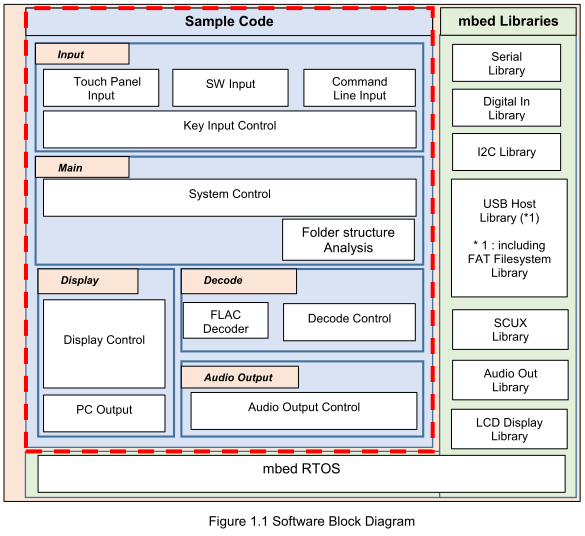
1.2 Pin Definitions
Table 1.1 shows the pins used in this sample code.
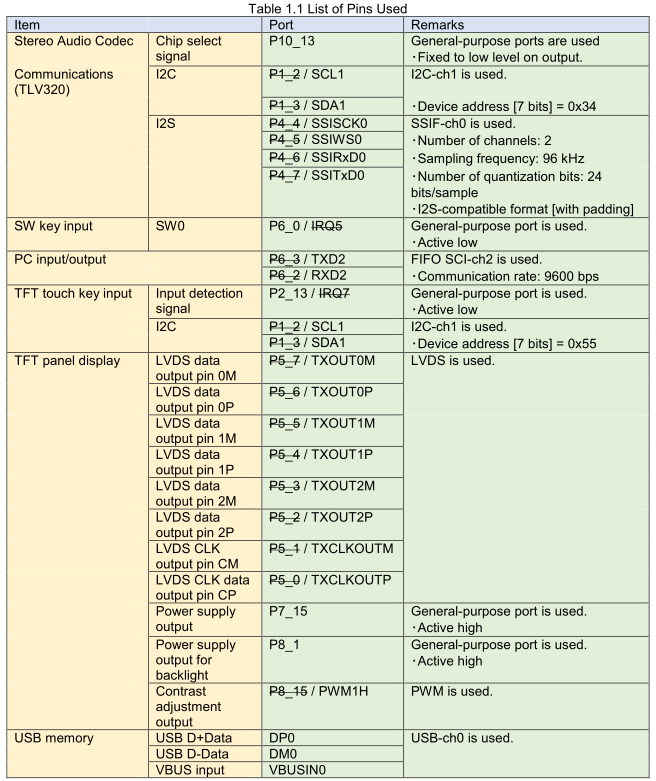
2. Sample Code Operating Environment
In order to operate this sample code, GR-PEACH, Audio Camera Shield and 7.1 inch LCD Shield must be needed. For details on Audio Camera Shield and 7.1 inch LCD Shield, please refer to the following links, respectively:
- Audio Camera Shield
https://developer.mbed.org/teams/Renesas/wiki/Audio_Camera-shield - 7.1 inch LCD Shield
https://developer.mbed.org/teams/Renesas/wiki/LCD-shield
In this section, it is described that how board is configured and to control audio playback via command line and touch screen.
2.1 Operating Environment
Figure 2.1 shows the overview of the operating environment for this sample code.
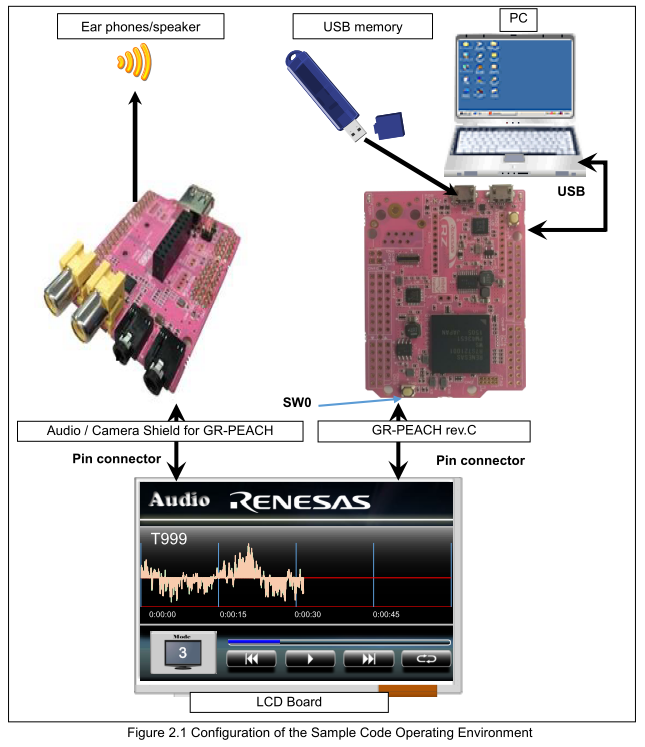
Figure 2.2 and 2.3 show how to configure GR-PEACH, Audio Camera Shield and 7.1 inch LCD shield when using USB0 and USB1, respectively.
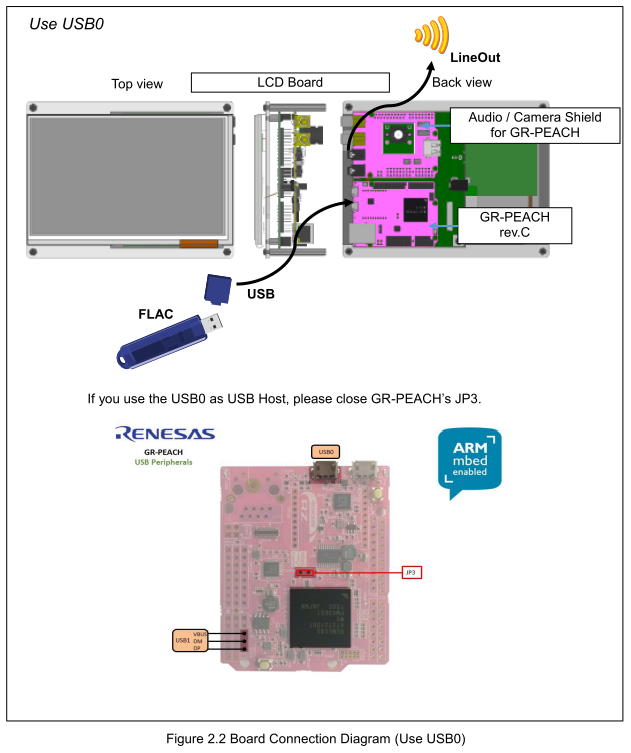
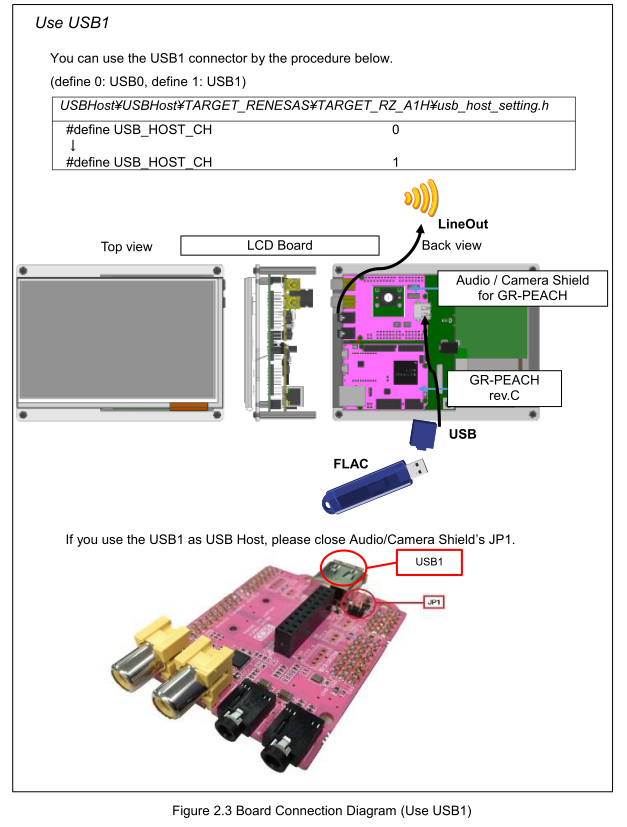
Table 2.1 lists the overview of Graphical User Interface (GUI) of this sample code.
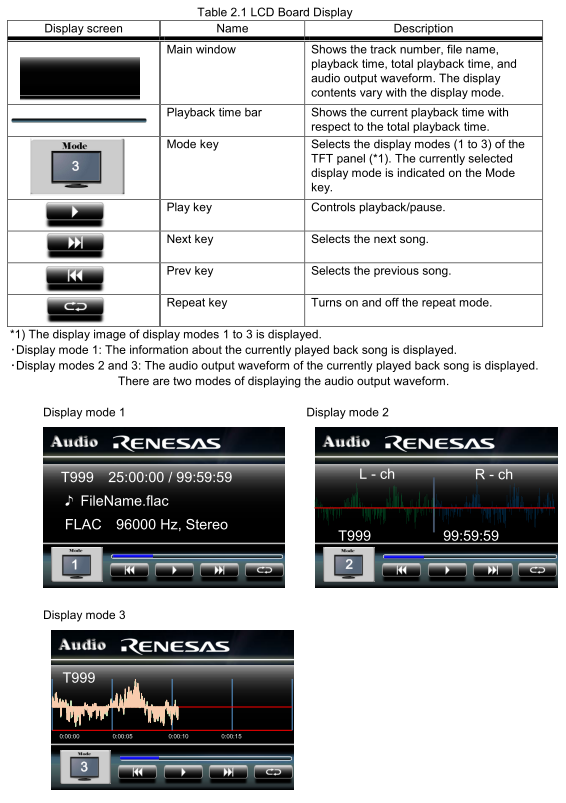
2.2 List of User Operations
Table 2.2 shows the relationship among Audio Playback, Command Line and Onboard Switch.
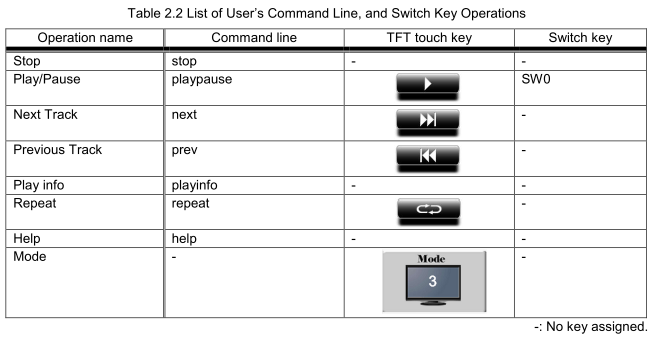
3. Function Outline
Table 3.1, 3.2 and 3.3 shows the overview of functions implemented in this sample code.
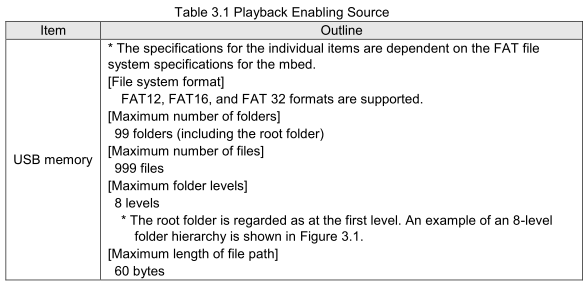
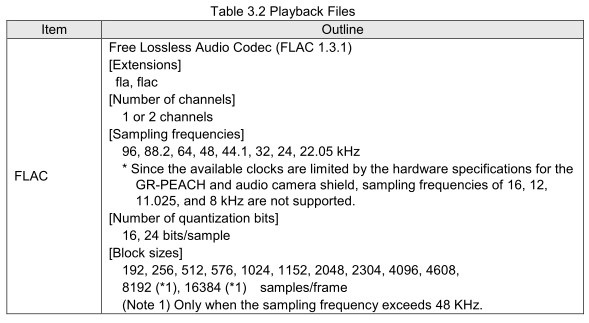
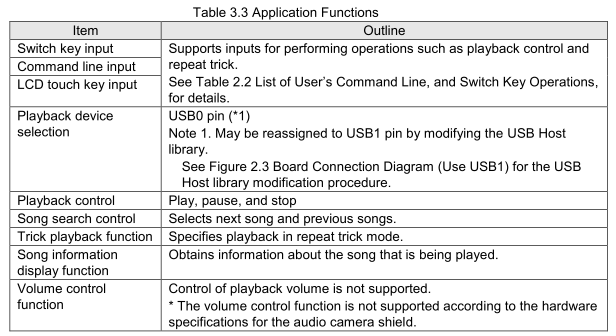
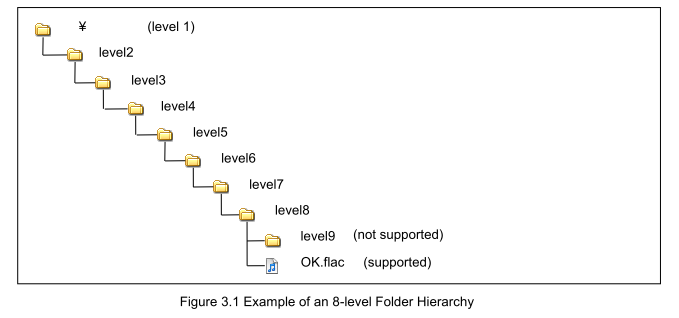
3.1 Playback Control
This sample program supports the operation "play", "pause", "stop", "play next song" and "play previous song".
3.2 Trick Play Control
In order to enable/disable Repeat Mode, user need to type "repeat" on command line or click the corresponding icon shown in Table 2.2. By derault, Repeat Mode is enabled. When Repeat Mode is enabled, the first song is played back after the playback of the last song is finished. Otherwise, the playback is shopped when finishing to play back the last song.
3.3 How to see Song Information
The information of the song being played back can be seen by typing playinfo on command line. Table 3.4 lists the items user can see on the terminal.

3.4 How to analyze the folder structure in USB stick
In this sample code, the folder structure in USB stick is analyzed in the breadth-first order. Table 3.5 shows how the files in USB stick are numbered.
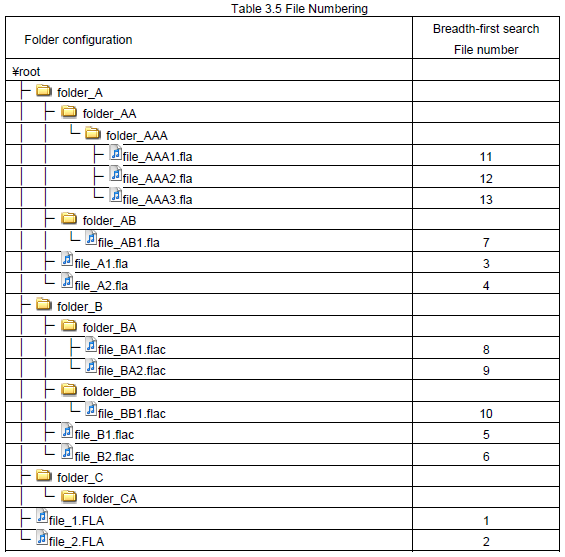
4.Others
4.1 Serial Communication Setting
With respect to the default serial communication related setting on mbed, please refer to the follwing link:
https://developer.mbed.org/teams/Renesas/wiki/GR-PEACH-Getting-Started#install-the-usb-serial-communication
Please set up the terminal software you would like to use on your PC in consideration of the above. For example, 9600 should be specified for the baud rate on the terminal in order to control this sample via command line.
4.2 Necessary modification when using GCC ARM Embedded
If you would like to use GCC ARM Embedded, you must revise the following linker script incorporated in mbed OS 5 package as follows:
- Linker Script to be modified
$(PROJECT_ROOT)/mbed-os/targets/TARGET_RENESAS/TARGET_RZ_A1H/device/TOOLCHAIN_GCC_ARM/RZA1H.ld
Please note that $(PROJECT_ROOT) in the above denotes the root directory of this sample code
- Before Modification
RZA1H.ld
/* Linker script for mbed RZ_A1H */
/* Linker script to configure memory regions. */
MEMORY
{
ROM (rx) : ORIGIN = 0x00000000, LENGTH = 0x02000000
BOOT_LOADER (rx) : ORIGIN = 0x18000000, LENGTH = 0x00004000
SFLASH (rx) : ORIGIN = 0x18004000, LENGTH = 0x07FFC000
L_TTB (rw) : ORIGIN = 0x20000000, LENGTH = 0x00004000
RAM (rwx) : ORIGIN = 0x20020000, LENGTH = 0x00700000
RAM_NC (rwx) : ORIGIN = 0x20900000, LENGTH = 0x00100000
}
(snip)
- After Modification
RZA1H.ld
/* Linker script for mbed RZ_A1H */
/* Linker script to configure memory regions. */
MEMORY
{
ROM (rx) : ORIGIN = 0x00000000, LENGTH = 0x02000000
BOOT_LOADER (rx) : ORIGIN = 0x18000000, LENGTH = 0x00004000
SFLASH (rx) : ORIGIN = 0x18004000, LENGTH = 0x07FFC000
L_TTB (rw) : ORIGIN = 0x20000000, LENGTH = 0x00004000
RAM (rwx) : ORIGIN = 0x20020000, LENGTH = 0x00180000
RAM_NC (rwx) : ORIGIN = 0x20200000, LENGTH = 0x00680000
}
(snip)
Diff: flac/README
- Revision:
- 0:ee40da884cfc
--- /dev/null Thu Jan 01 00:00:00 1970 +0000 +++ b/flac/README Fri Oct 16 04:28:07 2015 +0000 @@ -0,0 +1,254 @@ +/* FLAC - Free Lossless Audio Codec + * Copyright (C) 2001-2009 Josh Coalson + * Copyright (C) 2011-2014 Xiph.Org Foundation + * + * This file is part the FLAC project. FLAC is comprised of several + * components distributed under different licenses. The codec libraries + * are distributed under Xiph.Org's BSD-like license (see the file + * COPYING.Xiph in this distribution). All other programs, libraries, and + * plugins are distributed under the LGPL or GPL (see COPYING.LGPL and + * COPYING.GPL). The documentation is distributed under the Gnu FDL (see + * COPYING.FDL). Each file in the FLAC distribution contains at the top the + * terms under which it may be distributed. + * + * Since this particular file is relevant to all components of FLAC, + * it may be distributed under the Xiph.Org license, which is the least + * restrictive of those mentioned above. See the file COPYING.Xiph in this + * distribution. + */ + + +FLAC is an Open Source lossless audio codec developed by Josh Coalson from 2001 +to 2009. + +From January 2012 FLAC is being maintained by Erik de Castro Lopo under the +auspices of the Xiph.org Foundation. + +FLAC is comprised of + * `libFLAC', a library which implements reference encoders and + decoders for native FLAC and Ogg FLAC, and a metadata interface + * `libFLAC++', a C++ object wrapper library around libFLAC + * `flac', a command-line program for encoding and decoding files + * `metaflac', a command-line program for viewing and editing FLAC + metadata + * player plugin for XMMS + * user and API documentation + +The libraries (libFLAC, libFLAC++) are +licensed under Xiph.org's BSD-like license (see COPYING.Xiph). All other +programs and plugins are licensed under the GNU General Public License +(see COPYING.GPL). The documentation is licensed under the GNU Free +Documentation License (see COPYING.FDL). + + +=============================================================================== +FLAC - 1.3.1 - Contents +=============================================================================== + +- Introduction +- Prerequisites +- Note to embedded developers +- Building in a GNU environment +- Building with Makefile.lite +- Building with MSVC +- Building on Mac OS X + + +=============================================================================== +Introduction +=============================================================================== + +This is the source release for the FLAC project. See + + doc/html/index.html + +for full documentation. + +A brief description of the directory tree: + + doc/ the HTML documentation + examples/ example programs demonstrating the use of libFLAC and libFLAC++ + include/ public include files for libFLAC and libFLAC++ + man/ the man pages for `flac' and `metaflac' + src/ the source code and private headers + test/ the test scripts + +If you have questions about building FLAC that this document does not answer, +please submit them at the following tracker so this document can be improved: + + https://sourceforge.net/p/flac/support-requests/ + + +=============================================================================== +Prerequisites +=============================================================================== + +To build FLAC with support for Ogg FLAC you must have built and installed +libogg according to the specific instructions below. You must have +libogg 1.1.2 or greater, or there will be seeking problems with Ogg FLAC. + +If you are building on x86 and want the assembly optimizations, you will +need to have NASM >= 0.98.30 installed according to the specific instructions +below. + + +=============================================================================== +Note to embedded developers +=============================================================================== + +libFLAC has grown larger over time as more functionality has been +included, but much of it may be unnecessary for a particular embedded +implementation. Unused parts may be pruned by some simple editing of +configure.ac and src/libFLAC/Makefile.am; the following dependency +graph shows which modules may be pruned without breaking things +further down: + +metadata.h + stream_decoder.h + format.h + +stream_encoder.h + stream_decoder.h + format.h + +stream_decoder.h + format.h + +In other words, for pure decoding applications, both the stream encoder +and metadata editing interfaces can be safely removed. + +There is a section dedicated to embedded use in the libFLAC API +HTML documentation (see doc/html/api/index.html). + +Also, there are several places in the libFLAC code with comments marked +with "OPT:" where a #define can be changed to enable code that might be +faster on a specific platform. Experimenting with these can yield faster +binaries. + + +=============================================================================== +Building in a GNU environment +=============================================================================== + +FLAC uses autoconf and libtool for configuring and building. +Better documentation for these will be forthcoming, but in +general, this should work: + +./configure && make && make check && make install + +The 'make check' step is optional; omit it to skip all the tests, +which can take several hours and use around 70-80 megs of disk space. +Even though it will stop with an explicit message on any failure, it +does print out a lot of stuff so you might want to capture the output +to a file if you're having a problem. Also, don't run 'make check' +as root because it confuses some of the tests. + +NOTE: Despite our best efforts it's entirely possible to have +problems when using older versions of autoconf, automake, or +libtool. If you have the latest versions and still can't get it +to work, see the next section on Makefile.lite. + +There are a few FLAC-specific arguments you can give to +`configure': + +--enable-debug : Builds everything with debug symbols and some +extra (and more verbose) error checking. + +--disable-asm-optimizations : Disables the compilation of the +assembly routines. Many routines have assembly versions for +speed and `configure' is pretty good about knowing what is +supported, but you can use this option to build only from the +C sources. May be necessary for building on OS X (Intel). + +--enable-sse : If you are building for an x86 CPU that supports +SSE instructions, you can enable some of the faster routines +if your operating system also supports SSE instructions. flac +can tell if the CPU supports the instructions but currently has +no way to test if the OS does, so if it does, you must pass +this argument to configure to use the SSE routines. If flac +crashes when built with this option you will have to go back and +configure without --enable-sse. Note that +--disable-asm-optimizations implies --disable-sse. + +--enable-local-xmms-plugin : Installs the FLAC XMMS plugin in +$HOME/.xmms/Plugins, instead of the global XMMS plugin area +(usually /usr/lib/xmms/Input). + +--with-ogg= +--with-xmms-prefix= +--with-libiconv-prefix= +Use these if you have these packages but configure can't find them. + +If you want to build completely from scratch (i.e. starting with just +configure.ac and Makefile.am) you should be able to just run 'autogen.sh' +but make sure and read the comments in that file first. + + +=============================================================================== +Building with Makefile.lite +=============================================================================== + +There is a more lightweight build system for do-it-yourself-ers. +It is also useful if configure isn't working, which may be the +case since lately we've had some problems with different versions +of automake and libtool. The Makefile.lite system should work +on GNU systems with few or no adjustments. + +From the top level just 'make -f Makefile.lite'. You can +specify zero or one optional target from 'release', 'debug', +'test', or 'clean'. The default is 'release'. There is no +'install' target but everything you need will end up in the +obj/ directory. + +If you are not on an x86 system or you don't have nasm, you +may have to change the DEFINES in src/libFLAC/Makefile.lite. If +you don't have nasm, remove -DFLAC__HAS_NASM. If your target is +not an x86, change -DFLAC__CPU_IA32 to -DFLAC__CPU_UNKNOWN. + + +=============================================================================== +Building with MSVC +=============================================================================== + +There are .vcproj projects and a master FLAC.sln solution to build all +the libraries and executables with MSVC 2005 or newer. + +Prerequisite: you must have the Ogg libraries installed as described +later. + +Prerequisite: you must have nasm installed, and nasm.exe must be in +your PATH, or the path to nasm.exe must be added to the list of +directories for executable files in the MSVC global options. + +To build everything, run Visual Studio, do File|Open and open FLAC.sln. +From the dropdown in the toolbar, select "Release" instead of "Debug", +then do Build|Build Solution. + +This will build all libraries both statically (e.g. +objs\release\lib\libFLAC_static.lib) and as DLLs (e.g. +objs\release\lib\libFLAC.dll), and it will build all binaries, statically +linked (e.g. objs\release\bin\flac.exe). + +Everything will end up in the "objs" directory. DLLs and .exe files +are all that are needed and can be copied to an installation area and +added to the PATH. + +By default the code is configured with Ogg support. Before building FLAC +you will need to get the Ogg source distribution +(see http://xiph.org/downloads/), build libogg_static.lib (load +win32\libogg_static.sln, change solution configuration to "Release" and +code generation to "Multi-threaded (/MT)", then build), copy libogg_static.lib +into FLAC's 'objs\release\lib' directory, and copy the entire include\ogg tree +into FLAC's 'include' directory (so that there is an 'ogg' directory in FLAC's +'include' directory with the files ogg.h, os_types.h and config_types.h). + +If you want to build without Ogg support, instead edit all .vcproj files +and remove any "FLAC__HAS_OGG" definitions. + + +=============================================================================== +Building on Mac OS X +=============================================================================== + +If you have Fink or a recent version of OS X with the proper autotools, +the GNU flow above should work.
